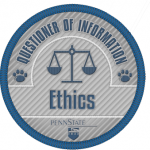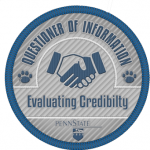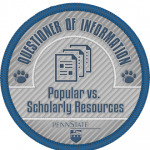Questioner of Information: Ethics
The earner of this badge will understand many of the ethical issues surrounding information literacy and the technologies associated with information literacy. The student will be able to differentiate between free and fee-based access to information and the issues surrounding this. In addition to this, the earner will learn what plagiarism is and why it is important to appropriately give credit to sources used.
This badge fulfills the ACRL Information Literacy Standard 5, Performance Indicator 1, Outcomes b and d, Performance Indicator 2, outcome f. Standard 5 – The information literate student understands many of the economic, legal, and social issues surrounding the use of information and accesses and uses information ethically and legally. Performance Indicator 1 – The information literate student understands many of the ethical, legal and socio-economic issues surrounding information and information technology. Outcome b – Identifies and discusses issues related to free vs. fee-based access to information. Outcome d – Demonstrates an understanding of intellectual property, copyright, and fair use of copyrighted material. Performance Indicator 2 – The information literate student follows laws, regulations, institutional policies, and etiquette related to the access and use of information resources. Outcome f – Demonstrates an understanding of what constitutes plagiarism and does not represent work attributable to others as his/her own.
Questioner of Information: Evaluating Credibility
This learner has applied what they already informally and subconsciously do to their intentional learning and become an expert at evaluating the credibility of information, specifically information found online.
For professionals concerned with standards: This badge fulfills ACRL Standard Three: The information literate student evaluates information and its sources critically and incorporates selected information into his or her knowledge base and value system. Performance Indicator 2: The information literate student articulates and applies initial criteria for evaluating both the information and its sources. Outcomes A, C, and D: Examines and compares information from various sources in order to evaluate reliability, validity, accuracy, authority, timeliness, point of view or bias, recognizing the presence of prejudice, and recognizing the cultural, physical, or other context within which the information was created and understands the impact of context on interpreting the information.
Questioner of Information: Primary vs Secondary Sources
In this badge, learners will become experts in identifying the differences between a primary and secondary source of information through reflective activities, interactive learning experiences, and critical thinking using various resources.
This badge meets the ACRL standard 1: The information literate student determines the nature and extent of information needed. Performance indicator 2: The information literate student identifies a variety of types and formats of potential sources for information. Outcome E and F: Differentiates between primary and secondary sources, recognizing how their use and importance vary with each discipline and realizes that information may need to be constructed with raw data from primary sources.
Questioner of Information: Popular vs Scholarly Sources
This badge provides an activity for the earners so that they gain competence in understanding the differences between popularly and scholarly articles and when it is appropriate to use each of these sources in research.
ACRL Standards Included: Standard One, Performance Indicator 4, Outcomes 1 and 4 Identifies the purpose and audience of potential resources (e.g., popular vs. scholarly, current vs. historical).




